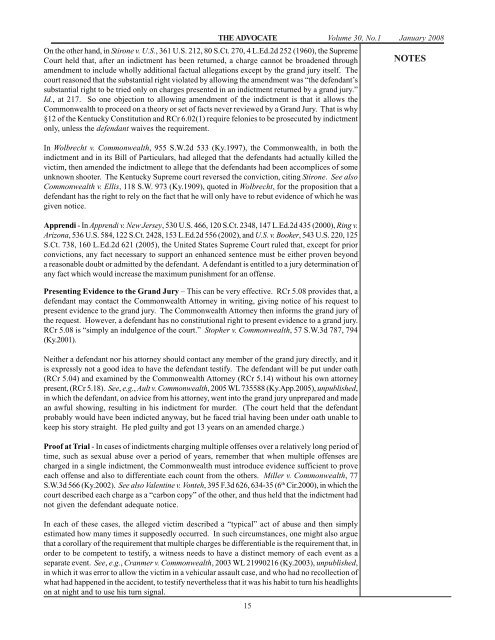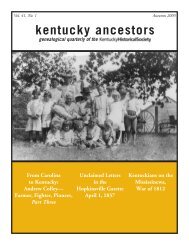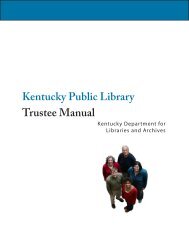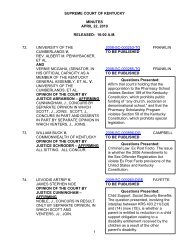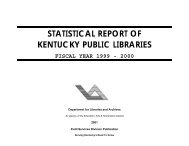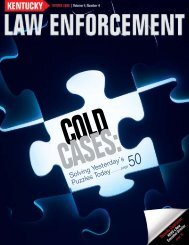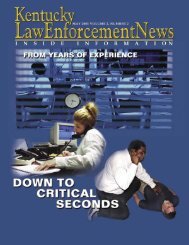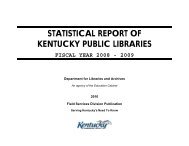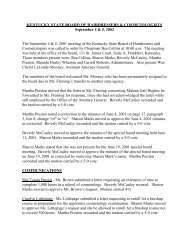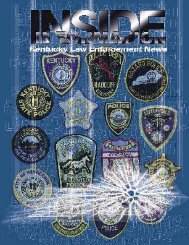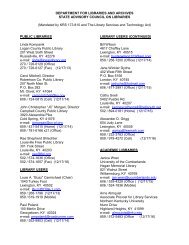Jan08 Advo.pmd - e-archives Home
Jan08 Advo.pmd - e-archives Home
Jan08 Advo.pmd - e-archives Home
Create successful ePaper yourself
Turn your PDF publications into a flip-book with our unique Google optimized e-Paper software.
THE ADVOCATE Volume 30, No.1 January 2008<br />
On the other hand, in Stirone v. U.S., 361 U.S. 212, 80 S.Ct. 270, 4 L.Ed.2d 252 (1960), the Supreme<br />
Court held that, after an indictment has been returned, a charge cannot be broadened through<br />
amendment to include wholly additional factual allegations except by the grand jury itself. The<br />
court reasoned that the substantial right violated by allowing the amendment was “the defendant’s<br />
substantial right to be tried only on charges presented in an indictment returned by a grand jury.”<br />
Id., at 217. So one objection to allowing amendment of the indictment is that it allows the<br />
Commonwealth to proceed on a theory or set of facts never reviewed by a Grand Jury. That is why<br />
§12 of the Kentucky Constitution and RCr 6.02(1) require felonies to be prosecuted by indictment<br />
only, unless the defendant waives the requirement.<br />
In Wolbrecht v. Commonwealth, 955 S.W.2d 533 (Ky.1997), the Commonwealth, in both the<br />
indictment and in its Bill of Particulars, had alleged that the defendants had actually killed the<br />
victim, then amended the indictment to allege that the defendants had been accomplices of some<br />
unknown shooter. The Kentucky Supreme court reversed the conviction, citing Stirone. See also<br />
Commonwealth v. Ellis, 118 S.W. 973 (Ky.1909), quoted in Wolbrecht, for the proposition that a<br />
defendant has the right to rely on the fact that he will only have to rebut evidence of which he was<br />
given notice.<br />
Apprendi - In Apprendi v. New Jersey, 530 U.S. 466, 120 S.Ct. 2348, 147 L.Ed.2d 435 (2000), Ring v.<br />
Arizona, 536 U.S. 584, 122 S.Ct. 2428, 153 L.Ed.2d 556 (2002), and U.S. v. Booker, 543 U.S. 220, 125<br />
S.Ct. 738, 160 L.Ed.2d 621 (2005), the United States Supreme Court ruled that, except for prior<br />
convictions, any fact necessary to support an enhanced sentence must be either proven beyond<br />
a reasonable doubt or admitted by the defendant. A defendant is entitled to a jury determination of<br />
any fact which would increase the maximum punishment for an offense.<br />
Presenting Evidence to the Grand Jury – This can be very effective. RCr 5.08 provides that, a<br />
defendant may contact the Commonwealth Attorney in writing, giving notice of his request to<br />
present evidence to the grand jury. The Commonwealth Attorney then informs the grand jury of<br />
the request. However, a defendant has no constitutional right to present evidence to a grand jury.<br />
RCr 5.08 is “simply an indulgence of the court.” Stopher v. Commonwealth, 57 S.W.3d 787, 794<br />
(Ky.2001).<br />
Neither a defendant nor his attorney should contact any member of the grand jury directly, and it<br />
is expressly not a good idea to have the defendant testify. The defendant will be put under oath<br />
(RCr 5.04) and examined by the Commonwealth Attorney (RCr 5.14) without his own attorney<br />
present, (RCr 5.18). See, e.g., Ault v. Commonwealth, 2005 WL 735588 (Ky.App.2005), unpublished,<br />
in which the defendant, on advice from his attorney, went into the grand jury unprepared and made<br />
an awful showing, resulting in his indictment for murder. (The court held that the defendant<br />
probably would have been indicted anyway, but he faced trial having been under oath unable to<br />
keep his story straight. He pled guilty and got 13 years on an amended charge.)<br />
Proof at Trial - In cases of indictments charging multiple offenses over a relatively long period of<br />
time, such as sexual abuse over a period of years, remember that when multiple offenses are<br />
charged in a single indictment, the Commonwealth must introduce evidence sufficient to prove<br />
each offense and also to differentiate each count from the others. Miller v. Commonwealth, 77<br />
S.W.3d 566 (Ky.2002). See also Valentine v. Vonteh, 395 F.3d 626, 634-35 (6 th Cir.2000), in which the<br />
court described each charge as a “carbon copy” of the other, and thus held that the indictment had<br />
not given the defendant adequate notice.<br />
In each of these cases, the alleged victim described a “typical” act of abuse and then simply<br />
estimated how many times it supposedly occurred. In such circumstances, one might also argue<br />
that a corollary of the requirement that multiple charges be differentiable is the requirement that, in<br />
order to be competent to testify, a witness needs to have a distinct memory of each event as a<br />
separate event. See, e.g., Cranmer v. Commonwealth, 2003 WL 21990216 (Ky.2003), unpublished,<br />
in which it was error to allow the victim in a vehicular assault case, and who had no recollection of<br />
what had happened in the accident, to testify nevertheless that it was his habit to turn his headlights<br />
on at night and to use his turn signal.<br />
15<br />
NOTES


